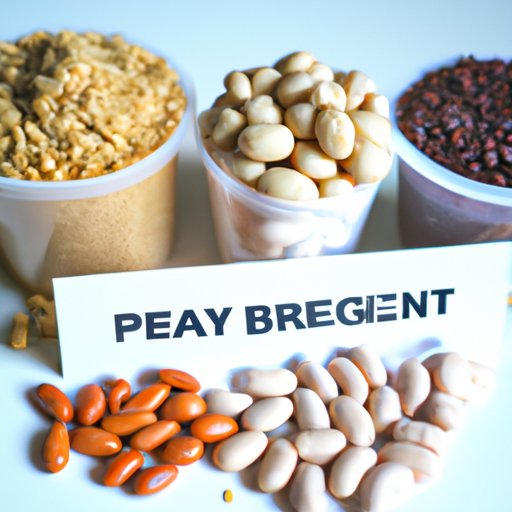Introduction
Protein is an essential nutrient that plays a key role in our overall health. It helps build muscles, repair tissues, and produce hormones, enzymes, and other molecules. The human body needs protein to function properly, and it’s important to get enough of it through food sources like beans.

A Comparison of the Protein Content of Different Types of Beans
Different types of beans contain varying amounts of protein. Here’s a comparison of the protein content of some of the most popular types of beans:
Soybeans
Soybeans are legumes that are rich in plant-based protein. One cup of cooked soybeans contains 28 grams of protein, making it one of the highest protein-rich beans on the market.
Black Beans
Black beans are another type of legume that is high in protein. One cup of cooked black beans contains 15 grams of protein.
Lentils
Lentils are a type of pulse that is packed with protein. One cup of cooked lentils contains 18 grams of protein.
Kidney Beans
Kidney beans are a type of legume that is high in protein. One cup of cooked kidney beans contains 13 grams of protein.
Chickpeas
Chickpeas are a type of legume that is high in protein. One cup of cooked chickpeas contains 12 grams of protein.
Pinto Beans
Pinto beans are a type of legume that is high in protein. One cup of cooked pinto beans contains 11 grams of protein.
How to Increase Your Protein Intake with Beans
Beans can be a great way to increase your protein intake. Here are some ways to add more beans to your diet:
Adding Beans to Salads and Soups
Beans can be added to salads or soups to boost the protein content. They also add texture, flavor, and color to dishes.
Making Bean Burgers
Bean burgers are a delicious and healthy alternative to traditional beef burgers. They’re packed with plant-based protein and are easy to make.
Using Beans as a Side Dish
Beans can be used as a side dish to any meal. They’re a great way to add extra protein to your plate.
The Benefits of Eating High-Protein Beans
Eating high-protein beans can provide numerous health benefits. Here are some of the benefits of eating high-protein beans:
Improved Muscle Growth and Recovery
Protein is essential for muscle growth and repair. Eating high-protein beans can help improve muscle growth and recovery after exercise.
Better Satiety
High-protein beans can help keep you feeling fuller for longer, which can help reduce overeating and promote weight loss.
Increased Energy Levels
High-protein beans can help boost your energy levels, which can be beneficial for those who lead active lifestyles.
Cooking with Protein-Rich Beans
Cooking with protein-rich beans is easy and delicious. Here are some tips for cooking with high-protein beans:
Soaking and Boiling Beans
Soaking and boiling beans is a simple way to prepare them. Soaking the beans overnight helps soften them, while boiling them helps cook them thoroughly.
Baking with Beans
Beans can be added to baked goods like breads and muffins to increase their protein content. Baked beans can also be used as a tasty side dish.
Marinating Beans
Marinating beans is a great way to add flavor to them. Marinating beans in oil and herbs or spices can give them a delicious flavor.

Nutritional Benefits of Eating Beans
In addition to being high in protein, beans are also a good source of other essential nutrients. Here are some of the nutritional benefits of eating beans:
High Fiber Content
Beans are high in fiber, which can help improve digestion and reduce cholesterol levels. Fiber can also help you feel fuller for longer, which can aid in weight loss.
Low Fat Content
Beans are low in fat, which can be beneficial for those looking to lose weight or maintain a healthy weight. They’re also a good source of healthy fats like Omega-3 fatty acids.
Low Glycemic Index
Beans have a low glycemic index, which means they won’t cause a spike in blood sugar levels. This can be beneficial for those with diabetes or other metabolic conditions.

A Guide to Choosing the Bean with the Most Protein
When choosing a bean with the most protein, there are a few things to consider. Here’s a guide to choosing the bean with the most protein:
Consider Your Dietary Needs
Consider your dietary needs when selecting the bean with the most protein. If you’re vegan or vegetarian, soybeans may be the best choice for you. If you’re looking for a high-fiber option, lentils may be the best choice.
Check the Protein Content
Check the protein content of the beans before purchasing. Soybeans are the highest in protein, followed by lentils, black beans, kidney beans, chickpeas, and pinto beans.
Look at Other Nutrients
Be sure to look at the other nutrients in beans before purchasing. Beans are a good source of fiber, healthy fats, and other essential vitamins and minerals.
Conclusion
Beans are an excellent source of plant-based protein. Different types of beans contain varying amounts of protein, so it’s important to compare the protein content of each type of bean before selecting one. Eating high-protein beans can provide numerous health benefits, such as improved muscle growth and recovery, better satiety, and increased energy levels. Beans are also a good source of fiber, healthy fats, and other essential vitamins and minerals. When choosing a bean with the most protein, consider your dietary needs, check the protein content, and look at other nutrients.


